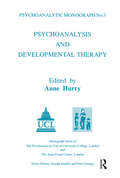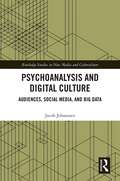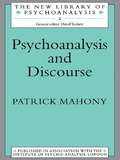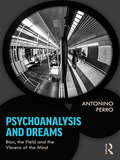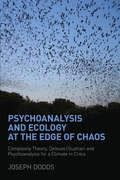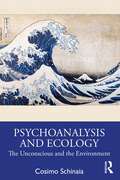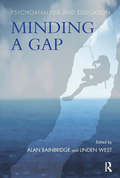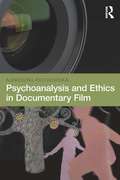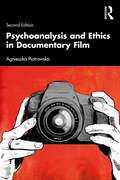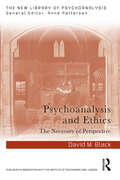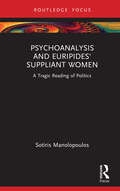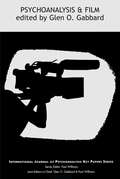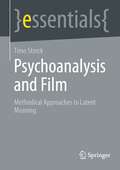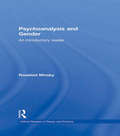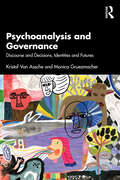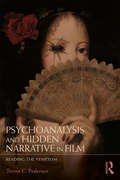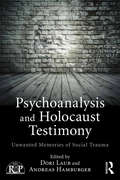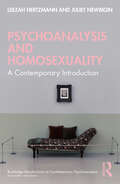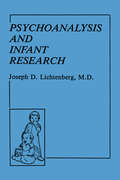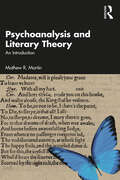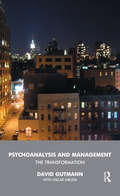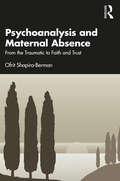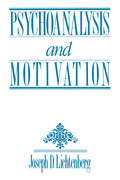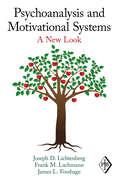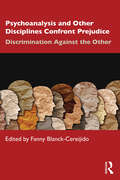- Table View
- List View
Psychoanalysis and Developmental Therapy (The Psychoanalytic Monograph Series)
by Anne HurryThis book exemplifies a special kind of application of psychoanalysis. It shows how the child uses the analyst both as a transference object and as a new developmental object, illustrating the mutually enabling and inextricably interwoven nature of developmental work and interpretation of conflict.
Psychoanalysis and Digital Culture: Audiences, Social Media, and Big Data (Routledge Studies in New Media and Cyberculture)
by Jacob JohanssenPsychoanalysis and Digital Culture offers a comprehensive account of our contemporary media environment—digital culture and audiences in particular—by drawing on psychoanalysis and media studies frameworks. It provides an introduction to the psychoanalytic affect theories of Sigmund Freud and Didier Anzieu and applies them theoretically and methodologically in a number of case studies. Johanssen argues that digital media fundamentally shape our subjectivities on affective and unconscious levels, and he critically analyses phenomena such as television viewing, Twitter use, affective labour on social media, and data-mining. How does watching television involve the body? Why are we so drawn to reality television? Why do we share certain things on social media and not others? How are bodies represented on social media? How do big data and data mining influence our identities? Can algorithms help us make better decisions? These questions amongst others are addressed in the chapters of this wide-ranging book. Johanssen shows in a number of case studies how a psychoanalytic angle can bring new insights to audience studies and digital media research more generally. From audience research with viewers of the reality television show Embarrassing Bodies and how they unconsciously used it to work through feelings about their own bodies, to a critical engagement with Hardt and Negri's notion of affective labour and how individuals with bodily differences used social media for their own affective-digital labour, the book suggests that an understanding of affect based on Freud and Anzieu is helpful when thinking about media use. The monograph also discusses the perverse implications of algorithms, big data and data mining for subjectivities. In drawing on empirical data and examples throughout, Johanssen presents a compelling analysis of our contemporary media environment.
Psychoanalysis and Discourse (New Library of Psychoanalysis)
by Patrick MahonyAfter a detailed discussion of the significance of translation as a critical concept in psychoanalysis, Patrick Mahony proceeds to a comprehensive examination of 'free association', the cornerstone of psychoanalytic method. Next follows the consideration of free association in its relation to scientific rhetorical, expressive and literary discourse. Mahony then begins a detailed study of certain aspects of the text of Freud's Interpretation of Dreams and of issues involved in the oral reporting of dreams. Attention is subsequently turned to the analysis of Freud's own writing in general, and specifically to Totem and Taboo. Finally, the author shows how his ideas can illuminate literary classics (by Villon, Shakespeare, Kafka, and Jonson) and the debate about whether there is anything specific to women's discourse.
Psychoanalysis and Dreams: Bion, the Field and the Viscera of the Mind
by Antonino FerroPsychoanalysis and Dreams explores some of the cornerstones of Antonino Ferro’s theoretical model but also attempts to extend the dreamlike boundaries of the model. Based on Bion’s theory of alpha function and the analytic field, Ferro has developed his own original theorization of transformations in dreams and of work in the analytic session as a waking dream. Clearly highlighted in the book is Ferro’s theory that transformation in dreams is the activity which is constantly carried out in the mind of the analyst, who nullifies the reality-status of the patient’s communication and considers the patient’s narrative as a dream which must be constructed in real time in the encounter between the two minds at work. At the centre of Ferro's theoretical proposal stands the transition from a psychoanalysis of contents to a psychoanalysis which develops the apparatus for thinking, based on the conception of an unconscious in a perennial state of construction and transformation, which must be dreamed, and which continuously expands as it is dreamed. Psychoanalysis and Dreams is written for practicing and training psychoanalysts, psychotherapists and psychiatrists and will be helpful in everyday psychoanalytic and psychotherapeutic work.
Psychoanalysis and Ecology at the Edge of Chaos: Complexity Theory, Deleuze,Guattari and Psychoanalysis for a Climate in Crisis
by Joseph DoddsThis book argues that psychoanalysis has a unique role to play in the climate change debate through its placing emphasis on the unconscious dimensions of our mental and social lives. Exploring contributions from Freudian, Kleinian, Object Relations, Self Psychology, Jungian, and Lacanian traditions, the book discusses how psychoanalysis can help to unmask the anxieties, deficits, conflicts, phantasies and defences crucial in understanding the human dimension of the ecological crisis. Yet despite being essential to studying environmentalism and its discontents, psychoanalysis still remains largely a 'psychology without ecology.' The philosophy of Deleuze and Guattari, combined with new developments in the sciences of complexity, help us to build upon the best of these perspectives, providing a framework able to integrate Guattari's 'three ecologies' of mind, nature and society. This book thus constitutes a timely attempt to contribute towards a critical dialogue between psychoanalysis and ecology. Further topics of discussion include: ecopsychology and the greening of psychotherapy our ambivalent relationship to nature and the non-human complexity theory in psychoanalysis and ecology defence mechanisms against eco-anxiety and eco-grief Deleuze|Guattari and the three ecologies becoming-animal in horror and eco-apocalypse in science fiction films nonlinear ecopsychoanalysis. In our era of anxiety, denial, paranoia, apathy, guilt, hope, and despair in the face of climate change, this book offers a fresh and insightful psychoanalytic perspective on the ecological crisis. As such this book will be of great interest to all those in the fields of psychoanalysis, psychology, philosophy, and ecology, as well as all who are concerned with the global environmental challenges affecting our planet's future.
Psychoanalysis and Ecology: The Unconscious and the Environment
by Cosimo SchinaiaThis book presents the psychoanalyst with the question of how our enormously modified environmental conditions determine our subjective mental changes and vice versa. The gravity of the environmental crisis is amply clear and yet, in the face of such incontrovertible evidence, there is an emotional, more than cognitive, difficulty in comprehending the present reality and its future consequences. In understanding the collective imagination as permeating the individual one and vice versa, this book investigates this relationship of mutual co-determination between the individual traumatic stories told and experienced in the consulting room and the positive or negative environmental attitudes exhibited by patients. The pairing of clinical vignettes with dispatches from the collective imagination sheds light on the confused affective investments and anxieties that propel pathological defenses, such as negation, suppression, intellectualization, displacement, and disavowal. The final chapter concludes with notes on the role of hope in a damaged world and the importance of integrity within the psychoanalytic field and beyond. This book will be of great interest to psychoanalysts, psychotherapists, and psychiatrists, as well as anthropologists, environmentalists, and ecologists.
Psychoanalysis and Education: Minding a Gap
by Linden West Alan BainbridgeThis book provides a unique and highly topical application of psychoanalytic theory to the broad context of education, including schools, universities, and adult learning. Education is understood as a crucial element in a lifelong project to gain more coherent and meaningful understanding of self and others. Psychoanalysis has taken the contingency, construction, and development of human subjectivity, as well as the difficulty of thinking, to be its prime preoccupation. Yet - at a time of increasing doubt and anxiety about the purposes and practice of education - psychoanalytic understanding, from various traditions, has never been more marginal in educational debate. The book seeks, in these terms, to bridge some of this gap: it is written for teachers, trainers, policy-makers, clinicians, researchers, and diverse academics who want to look beyond bland superficialities to deeper struggles for self and understanding. This includes unconscious processes in the relationships that constitue education as well as resistance to new ideas and practices.
Psychoanalysis and Ethics in Documentary Film
by Agnieszka PiotrowskaThis distinctively interdisciplinary approach to the subject encompasses filmmaking, psychoanalysis, philosophy and popular culture and offers a unique insight into documentary film practice from a psychoanalytic perspective. At the heart of the enquiry is belief that ‘transference-love’ is present in the documentary encounter. With a focus on testimony-driven film and a foreword by Michael Renov, who calls this book 'a radical and compelling account', Psychoanalysis and Ethics in Documentary Film covers a range of topics including: Four fundamental concepts of psychoanalysis and documentary film A review of documentary film practice A personal account of the author’s relationship with a subject of her own work A thorough interrogation of the ethics of documentary Ideal for film studies scholars, psychoanalysts, psychotherapists and psychotherapeutically engaged professionals, as well as filmmakers, culture studies students and anyone interested in the process of documentary-making and contemporary culture, this work offers a unique approach.
Psychoanalysis and Ethics in Documentary Film
by Agnieszka PiotrowskaThis distinctively interdisciplinary book draws upon psychoanalytic theory to explore how expectations, desires and fears of documentary subjects and filmmakers are engaged, and the ethical issues that can arise as a result. Original and accessible, the second edition of this ground-breaking book addresses the four fundamental concepts of psychoanalysis and documentary film, reviews documentary film practice as a field, provides a personal account of the author’s relationship with a subject of her own work, and presents a thorough interrogation of the ethics of documentary. The updated text includes a new introduction by the author and an additional chapter ‘Stories We Tell’ by Sarah Polley, centered on ethics and the role of the filmmaker in relation to her participants. Psychoanalysis and Ethics in Documentary Film, 2nd revised edition has already been used widely and is crucial reading for film studies scholars, psychoanalysts, psychotherapists and psychotherapeutically engaged professionals, as well as filmmakers, culture studies students and anyone interested in the process of documentary-making and contemporary culture.
Psychoanalysis and Ethics: The Necessity of Perspective (New Library of Psychoanalysis)
by David M. BlackPsychoanalysis and Ethics: The Necessity of Perspective is an attempt to look deeply into the relationship between psychoanalysis and ethics, and in particular into the failure of traditional psychoanalytic thinking to recognise the foundational character of ethical values. In recent years, partly because of the climate crisis, the need for an "ethical turn" in our thinking has been recognised with increasing urgency. Using different historical lenses, and with special reference to the thought of the philosopher Emmanuel Levinas and pioneering American psychoanalysts such as Hans Loewald and Stephen Mitchell, the author discusses the perspectives needed in addition to those of science if the facts of "psychic reality" are to be more adequately recognised. In particular, this book emphasises the importance of a coherent account of the role of ethics in shaping the development both of the individual and of society. Psychoanalysis and Ethics is essential reading for those concerned for the importance of ethics in psychoanalytic practice and theory, and more widely for those seeking to understand the place of ethics and religion in psychological development.
Psychoanalysis and Euripides' Suppliant Women: A Tragic Reading of Politics (Routledge Focus on Mental Health)
by Sotiris ManolopoulosPsychoanalysis and Euripides' Suppliant Women applies the "tragic" reading of politics, presented by Euripides in his play, The Suppliant Women, to the contemporary world. Manolopoulos presents a psychoanalytic assessment of the key themes of the play, considering the phenomenon of hubris in public life indirectly, through its transformation in tragic poetry. Psychoanalysis and Euripides’ Suppliant Women goes on to consider how the foundations of the polis are linked to the integration of the work of mourning and the feminine core of existence, and how the aims of scholars who study the play correspond to psychoanalysis’ work towards understanding the psychic and social reality of politics. This book allows for a deeper understanding of the pathological modes of mental functioning that manifest in politics. It will be of interest to psychoanalysts in practice and in training and academics and scholars of psychoanalytic studies, politics, and classical studies.
Psychoanalysis and Film (The IJPA Key Papers Series)
by Glen O. GabbardThis volume contains a collection of outstanding examples of psychoanalytic film criticism, applying different theoretical orientations, drawn from the first four years of the film review section in the International Journal of Psychoanalysis during author's tenure as film review editor.
Psychoanalysis and Film: Methodical Approaches to Latent Meaning (essentials)
by Timo StorckThis essential is dedicated to the connection between psychoanalysis and film. Psychoanalysis is suitable for a methodically guided film viewing. This is not an application of psychoanalytical theory, but rather an application of its method of a reflected relationship to a counterpart. In this way, latent meanings can be taken into consideration and an interpretation can be developed. This essential reconstructs the possibilities of such an approach and presents existing approaches. Finally, a guideline for carrying out a film psychoanalytical interpretation is proposed. Numerous film examples serve to illustrate this.The translation was done with the help of artificial intelligence. A subsequent human revision was done primarily in terms of content.
Psychoanalysis and Gender: An Introductory Reader (Critical Readers in Theory and Practice)
by Rosalind MinskyWhat is object-relations theory and what does it have to do with literary studies? How can Freud's phallocentric theories be applied by feminist critics? In Psychoanalysis and Gender: An Introductory Reader Rosalind Minsky answers these questions and more, offering students a clear, straightforward overview without ever losing them in jargon.In the first section Minsky outlines the fundamentals of the theory, introducing the key thinkers and providing clear commentary. In the second section, the theory is demonstrated by an anthology of seminal essays which includes:* Feminity by Sigmund Freud* Envy and Gratitude by Melanie Klein* An extract from Transitional Objects and Transitional Phenomena by Donald Winnicot* The Meaning of the Phallus by Jacques Lacan* An extract from Women's Time by Julia Kristeva* An extract from Speculum of the Other Woman by Luce Irigaray
Psychoanalysis and Governance: Discourse and Decisions, Identities and Futures
by Kristof Van Assche Monica GruezmacherPsychoanalysis and Governance makes a cogent argument for the use of psychoanalytic perspectives in the understanding of governance, the process of collective decision-making that maintains and reshapes communities.This book is highly relevant to those interested in the ever-expanding field of applications of psychoanalysis and for all those willing to observe the discursive and affective underpinnings of public policy, administration, and planning. It locates the potential for self-analysis and self-transformation within governance, yet also indicates governance as the confluence of diverging understandings of the ideas of community and governance itself, as the place where competing desires and variegated patterns of fears and hopes collide and hold the transformational potential to destabilize the community.Building on Freudian, Lacanian, and other psychoanalytic traditions, the book enriches our understanding of governance, the way communities remember and forget, are haunted by the past, remain untransparent to themselves yet also retain the possibility of reinvention, of imagining alternative selves, new futures, and discover paths to move in that direction. This book will be a suitable for psychoanalysts, planners, and all those interested in informed governance.
Psychoanalysis and Hidden Narrative in Film: Reading the Symptom
by Trevor C. PedersonPsychoanalysis and Hidden Narrative in Film proposes a way of constructing hidden psychological narratives of popular film and novels. Instead of offering interpretations of classic films, Trevor C. Pederson recognizes that the psychoanalytic tradition began with making sense of the seemingly inconsequential. Here he turns his attention to popular films like Joel Schumacher's The Lost Boys (1987). While masterworks like Psycho (1960) are not the object of interpretation, Hitchcock’s film is used as a skeleton key. The revelation that Norman Bates’ character had been his mother all along, suggests a framework of reading a film as having symptom characters who are excised to create a latent plot. The symptom character's behavior or inter-relations are then transcribed to an ego character. This is a shift in the tradition of literary doubling from hermeneutic intuition to a formal methodology that generates data for the unconscious. Pederson continues the project of unifying competing schools into a single model of mind and offers clinical examples from his own practice for all its terms. Psychodynamic techniques that emphasize the importance of working with the body, the id, and the ubiquity of repetition are introduced. A return to Freud’s structural theory, in which complexes are anchored in the stages of superego development, is used to carefully plot and explain the social nature of the superego and its relation to authority in society (secondary narcissism) and the otherworldly (primary narcissism). Discrete phases of superego development and their ties to both the social and the id revive the grand promises of classical psychoanalysis to link with every field in the humanities. Psychoanalysis and Hidden Narrative in Film will appeal to psychoanalysts and psychoanalytic psychotherapists as well as scholars of film studies and literature interested in using a psychoanalytic approach and ideas in their work.
Psychoanalysis and Holocaust Testimony: Unwanted Memories of Social Trauma (Relational Perspectives Book Series)
by Andreas Hamburger Dori LaubPsychoanalytic work with socially traumatised patients is an increasingly popular vocation, but remains extremely demanding and little covered in the literature. In Psychoanalysis and Holocaust Testimony, a range of contributors draw upon their own clinical work, and on research findings from work with seriously disturbed Holocaust survivors, to illuminate how best to conduct clinical work with such patients in order to maximise the chances of a positive outcome, and to reflect transferred trauma for the clinician. Psychoanalysis and Holocaust Testimony closely examines the phenomenology of destruction inherent in the discourse of extreme traumatization, focusing on a particular case study: the recording of video testimonies from a group of extremely traumatized, chronically hospitalized Holocaust survivors in psychiatric institutions in Israel. This case study demonstrates how society reacts to unwanted memories, in media, history, and psychoanalysis – but it also shows how psychotherapists and researchers try to approach the buried memories of the survivors, through being receptive to shattered life narratives. Questions of bearing witness, testimony, the role of denial, and the impact of traumatic narrative on society and subsequent generations are explored. A central thread of this book is the unconscious countertransference resistance to the trauma discourse, which manifests itself in arenas that are widely apart, such as genocide denial, the "disappearance" of the hospitalized Holocaust survivors and of their life stories, mishearing their testimonies and ultimately refusing them the diagnosis of "traumatic psychosis". Psychoanalysis and Holocaust Testimony provides an essential, multidisciplinary guide to working psychoanalytically with severely traumatised patients. It will appeal to psychoanalysts, psychoanalytic psychotherapists and trauma studies therapists.
Psychoanalysis and Homosexuality: A Contemporary Introduction (Routledge Introductions to Contemporary Psychoanalysis)
by Leezah Hertzmann Juliet NewbiginThis important book examines the ways in which same sex desire, or "homosexuality" has been theorised by psychoanalysis during its history to date and the impact of that on clinical practice. The authors explore a brief history of the developing social attitudes which influenced the evolution of psychoanalysis, from Freud’s radical questioning of psychosexuality, to the later developments that assumed a moral high ground for heteronormativity and led to the diagnosis of other forms of sexual expression as perversions requiring treatment. The book elucidates contemporary developments in psychoanalytic thinking about sexuality from a post-heteronormative standpoint, including an examination of how heteronormative bias has relegated lived sexual experience to the sidelines. The book challenges this bias and introduces new ways of using psychoanalytic ideas as well as illustrating their relevance to clinical practice. Drawing on vignettes, the authors describe current challenges that clinicians face and discuss the dilemmas that these challenges present, both for qualified clinicians as well as those in training. By approaching "homosexuality" from a contemporary post-heteronormative position, the authors advocate a more flexible encounter in the consulting room in a way that can illuminate an understanding of all sexualities, including heterosexuality.
Psychoanalysis and Infant Research (Psychoanalytic Inquiry Book Series #2)
by Joseph D. LichtenbergLichtenberg collates and summarizes recent findings about the first two years of life in order to examine their implications for contemporary psychoanalysis. He explores the implications of these data for the unfolding sense of self, and then draws on these data to reconceptualize the analytic situation and to formulate an experiential account of the therapeutic action of analysis.
Psychoanalysis and Literary Theory: An Introduction
by Mathew R. MartinPsychoanalysis and Literary Theory introduces the key concepts, figures and movements of both psychoanalytic theory and the history of literary criticism and theory, engaging with Freud, Zizek, Plato, posthumanism, and beyond. Divided into two parts - concepts and movements – the structure of the book is clear and accessible. Each chapter builds upon the one before, allowing the reader to progress from little or no background in psychoanalysis, philosophy, or literary theory to the ability to engage actively with the relatively sophisticated ideas presented in later sections of the work. Mathew R. Martin consistently directs attention to the task of interpreting texts by illustrating abstract theoretical points with literary texts and at apposite moments provides brief readings of selected texts. This book will be essential reading for academics and students of psychoanalytic studies, literary criticism, and literary theory.
Psychoanalysis and Management: The Transformation
by David Gutmann Oscar IarussiThe author is a highly successful consultant to leading institutions and organisations. In this enriching and challenging dialogue with the Italian journalist Oscar Iarussi, he brings his passion for life and unceasing search for true awareness for all to focus on the innovative principle of transformation. This book talks about transformation in a two-voice encounter resulting in a thought-provoking and rewarding read for laymen and academics alike. The tone of the account is philosophical, whilst being light and dense.
Psychoanalysis and Maternal Absence: From the Traumatic to Faith and Trust
by Ofrit Shapira-BermanExperience of maternal absence manifests in a variety of ways and this book explores a selection of its emotional, psychical, and somatic consequences as they relate to an individual’s relationship with their body, psychic-emotional internal life, and intimate relationships. This book is not about mothers, but how individuals handle the trauma of mothers they have not had. Spanning backgrounds such as the collective child-rearing method of the kibbutz in Israel through to the possible difficulties of children who are parented by single parents, born out of sperm or egg donation, and adults who have suffered chronic sexual abuse, Shapira-Berman observes the precarious position of the analyst and the tension between the acts of witnessing and participating in client interventions. Espousing the values of authenticity and creativity, this text concludes with a reconfiguration of the roles of faith and trust within psychoanalysis and offers hope to those on their therapeutic journeys. This book will be a valuable resource for psychotherapists, as well as for various undergraduate and postgraduate studies in object relations, childhood trauma, sexual trauma and clinical therapy.
Psychoanalysis and Motivation (Psychoanalytic Inquiry Book Series)
by Joseph D. LichtenbergCarrying forward his inquiry into the nature and conditions of normal and abnormal development, Lichtenberg focuses on motivation. His goal is to offer an alternative to psychoanalytic drive theory that accommodates the developmental insights of infancy research while accounting for the entire range of phenomena addressed by the theory of instinctual drives. To this end, he propounds a comprehensive theory of the self, which then gains expression in five discrete yet interactive motivational systems.
Psychoanalysis and Motivational Systems: A New Look (Psychoanalytic Inquiry Book Series)
by Joseph D. Lichtenberg Frank M. Lachmann James L. FosshageIntroduced in Psychoanalysis and Motivation (1989) and further developed in Self and Motivational Systems (1992), The Clinical Exchange (1996), and A Spirit of Inquiry (2002), motivational systems theory aims to identify the components and organization of mental states and the process by which affects, intentions, and goals unfold. Motivation is described as a complex intersubjective process that is cocreated in the developing individual embedded in a matrix of relationships with others. Opening by placing motivational systems theory within a contemporary dynamic systems theory, Lichtenberg, Lachmann, and Fosshage then respond to critics of motivational systems theory. The authors present revisions to their approach to the original five motivational systems, adding two more: an affiliative and a caregiving motivational system. The authors go on to suggest, using ideas garnered from complexity theory and fractals, that motivational systems theory can help us understand how a continuity of self can be maintained despite near-constant fluctuations in interpersonal relations. They then consider how the making of inferences, explicitly and implicitly, is shaped by motivation, before applying their theory to an actual human experience - love - to demonstrate the interplay of multiple shifting motivations within an individual. Last, they present new looks at the clinical applicability of their research. Grounded in observational research of infants but relevant to psychoanalysis at any stage of life, motivational systems theory has evolved via the combined experiences of these three analysts for more than 20 years, and remains an important contribution to our understanding of the driving forces behind human experience.
Psychoanalysis and Other Disciplines Confront Prejudice: Discrimination Against the Other
by Fanny Blanck-CereijidoPsychoanalysis and Other Disciplines Confront Prejudice: Discrimination Against the Other presents interdisciplinary perspectives on prejudice. This book considers both the negative and positive implications of a priori transmission of values and knowledge. It examines various aspects of prejudice from the perspectives of psychoanalysis, biology, sociology and law. The contributors consider prejudice to be a judgement that precedes experience; it organises and discriminates the events and facts we must assess to understand the world around us, thereby helping us make sense of the world of words, concepts, networks and values into which we are born. Chapters cover a range of topics such as racism, superstition, discrimination and prejudice in psychoanalytic practice. This volume provides a path-breaking treatment of prejudice and how it affects our lives and interactions with others. Psychoanalysts in training and in practice will find this book a vital resource.
